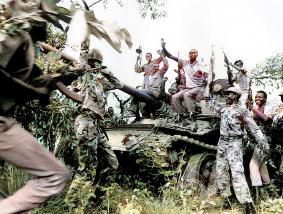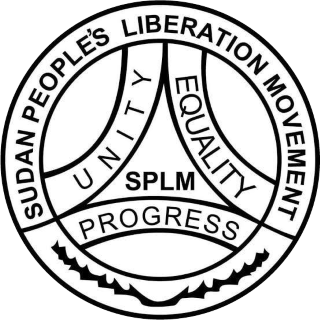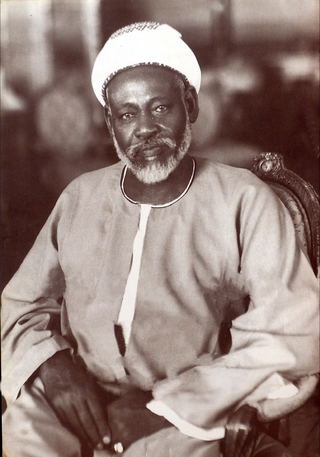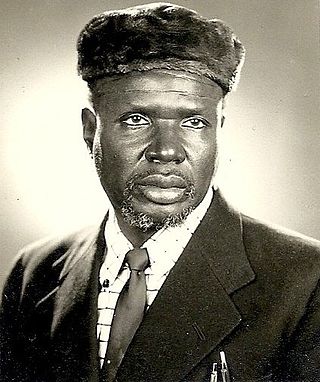Related Research Articles

Sudan, officially the Republic of the Sudan, is a country in Northeast Africa. It borders the Central African Republic to the southwest, Chad to the west, Egypt to the north, Eritrea to the northeast, Ethiopia to the southeast, Libya to the northwest, South Sudan to the south, and the Red Sea. It has a population of 45.7 million people as of 2022 and occupies 1,886,068 square kilometres, making it Africa's third-largest country by area and the third-largest by area in the Arab League. It was the largest country by area in Africa and the Arab League until the secession of South Sudan in 2011; since then both titles have been held by Algeria. Its capital city is Khartoum, and its most populous city is Omdurman.

The history of Sudan refers to both the territory of the Republic of the Sudan, including what became in 2011 the independent state of South Sudan. The territory of Sudan is geographically part of a larger African region, also known by the term "Sudan". The term is derived from Arabic: بلاد السودان bilād as-sūdān, or "land of the black people", and has sometimes been used more widely referring to the Sahel belt of West and Central Africa.

Ismail al-Azhari was a Sudanese nationalist and political figure. He served as the first Prime Minister of Sudan between 1954 and 1956, and as President of Sudan from 1965 until he was overthrown by Gaafar Nimeiry in 1969.

The Second Sudanese Civil War was a conflict from 1983 to 2005 between the central Sudanese government and the Sudan People's Liberation Army. It was largely a continuation of the First Sudanese Civil War of 1955 to 1972. Although it originated in southern Sudan, the civil war spread to the Nuba mountains and the Blue Nile. It lasted for almost 22 years and is one of the longest civil wars on record. The war resulted in the independence of South Sudan 6 years after the war ended.

General Ibrahim Abboud was a Sudanese political figure who served as the head of state of Sudan between 1958 and 1964 and as president of Sudan in 1964; however, he soon resigned, ending Sudan's first period of military rule. A career soldier, Abboud served in World War II in Egypt and Iraq. In 1949, Abboud became the deputy Commander in Chief of the Sudanese military. Upon independence, Abboud became the Commander in Chief of the Military of Sudan.

The First Sudanese Civil War was a conflict from 1955 to 1972 between the northern part of Sudan and the southern Sudan region that demanded representation and more regional autonomy. Around a million people died over the nearly 17 years and the war was divided into four major stages: initial guerrilla warfare, the creation of the Anyanya insurgency, political strife within the government and establishment of the South Sudan Liberation Movement.

Salva Kiir Mayardit, also known as Salva Kiir, is a South Sudanese politician who has been the President of South Sudan since its independence on 9 July 2011. Prior to independence, he was the President of the Government of Southern Sudan, as well as First Vice President of Sudan, from 2005 to 2011. He was named Commander-in-Chief of the Sudan People's Liberation Army (SPLA) in 2005, following the death of John Garang.

The Sudan People's Liberation Movement is a political party in South Sudan. It was initially founded as the political wing of the Sudan People's Liberation Army in 1983. On January 9, 2005 the SPLA, SPLM and Government of Sudan signed the Comprehensive Peace Agreement, ending the civil war. SPLM then obtained representation in the Government of Sudan, and was the main constituent of the Government of the then semi-autonomous Southern Sudan. When South Sudan became a sovereign state on 9 July 2011, SPLM became the ruling party of the new republic. SPLM branches in Sudan separated themselves from SPLM, forming the Sudan People's Liberation Movement-North. Further factionalism appeared as a result of the 2013-2014 South Sudanese Civil War, with President Salva Kiir leading the SPLM-Juba and former Vice President Riek Machar leading the Sudan People's Liberation Movement-in-Opposition.

The Sudanese Communist Party is a communist party in Sudan. Founded in 1946, it was a major force in Sudanese politics in the early post-independence years, and was one of the two most influential communist parties in the Arab world, the other being the Iraqi Communist Party.
Abel Alier Kwai is a South Sudanese politician and judge who served as Vice President of Sudan between 1971 and 1982 and as President of the High Executive Council of the Southern Sudan Autonomous Region between 1972 and 1978. After Sudan gained independence from the United Kingdom in 1956, Southern Sudan was not left as an independent state. This led to a deadly war a year before the independence. A party in the war was Anyanya 1 Under Joseph Lagu. Abel Alier was a politician who managed to complete his college education among many Southern Sudanese. He is an internationally respected judge, human-rights lawyer and activist on behalf of Christians in the Sudan. Former Vice President of Sudan (1971–1982), he served as the first president of the High Executive Council of Southern Sudan. He sits on the Permanent Court of International Arbitration in The Hague and is recognized as Sudan's most prominent Christian lawyer. His latest book is Southern Sudan: Too Many Agreements Dishonoured.

A referendum took place in Southern Sudan from 9 to 15 January 2011, on whether the region should remain a part of Sudan or become independent. The referendum was one of the consequences of the 2005 Naivasha Agreement between the Khartoum central government and the Sudan People's Liberation Army/Movement (SPLA/M).

South Sudan, officially the Republic of South Sudan, is a landlocked country in East Africa. It is bordered by Ethiopia, Sudan, the Central African Republic, the Democratic Republic of the Congo, Uganda, and Kenya. Its population was estimated at 11,088,796 in 2023. Juba is the capital and largest city.
William Deng Nhial was the political leader of the Sudan African National Union, SANU, from 1962 to 1968. He was elected unopposed. He was one of founders of the Anya Nya Military Wing of the Liberation of Southern Sudan, fighting for the independence of Southern Sudan. He was ambushed and killed by Sudan's army on 9 May 1968 at Cueibet, on his way from Rumbek to Tonj. The Sudan government denied having authorised the assassination. Although no investigation was conducted, eyewitnesses at Cueibet village and SANU investigation committee confirmed the assassins to be the Sudan army.
The Liberal Party, at first called the Southern Party and later the Southern Liberal Party, was formed in the Anglo-Egyptian Sudan before the Sudan became independent in January 1956. Until the military coup of November 1958 the Liberals were one of the main parties representing the Southern Sudan constituencies in parliament.
Abdel Rahman Sule is a South Sudanese politician who was one of the founders of the Liberal Party, officially registered as the "Southern Party" in 1953, the main party in Southern Sudan in the years immediately before and after independence in 1956.

Buth Diu or Böth Diew was a politician who was one of the leaders of the Liberal Party in Sudan in the years before and after independence in 1956. His party represented the interests of the southerners. Although in favor of a federal system under which the south would have its own laws and administration, Buth Diu was not in favor of southern secession. As positions hardened during the drawn-out First Sudanese Civil War (1955–1972) his compromise position was increasingly discredited.

Sayyid Abd al-Rahman al-Mahdi, KBE was one of the leading religious and political figures during the colonial era in the Anglo-Egyptian Sudan (1898–1955), and continued to exert great authority as leader of the Neo-Mahdists after Sudan became independent. The British tried to exploit his influence over the Sudanese people while at the same time profoundly distrusting his motives. Throughout most of the colonial era of the Anglo-Egyptian Sudan the British saw Sayyid Abd al-Rahman al-Mahdi as important as a moderate leader of the Mahdists.

The Catholic Church in South Sudan is composed of one ecclesiastical province with one archdiocese and six suffragan dioceses. There have been a total of 31 bishops in South Sudan to date. The bishops of South Sudan and Sudan are currently members of one single bishops' conference, designated as Sudan Catholic Bishops’ Conference.

Gordon Muortat Mayen Maborjok (1922–2008) was a South Sudanese veteran politician and an advocate for the rights and freedom of the South Sudanese people. He was the President of the Nile Provisional Government (NPG) which led Anyanya I; Southern Sudan's first armed resistance to Khartoum which started in 1955. Muortat also served as Vice-President of the Southern Front (SF) and Foreign Minister in the Southern Sudan Provisional Government (SSPG).
Riek Gai Kok is a South Sudanese politician. He is a Lou Nuer, hailing from Chieng Man-nyang/Diang-nyang Akoba. A veteran politician, he has been a member of parliament in both Sudan and South Sudan. As of 2013, he served as Minister of Health of South Sudan.
References
- 1 2 Lb Lokosang (2010). South Sudan: The Case for Independence & Learning from Mistakes. Xlibris Corporation. p. 146. ISBN 978-1-4535-7374-7.
- ↑ Douglas Hamilton Johnson (1998). 1951 - 1956 British documents on the end of empire. Stationery Office. p. 493. ISBN 0-11-290564-1.